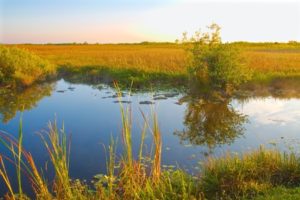Three Reasons the Wetlands are So Important

The wetlands are one of the main ecosystems on this earth with extensive biodiversity, but many people overlook the wetlands because they can appear as swamps and marshes that are often considered to be nothing but nuisances. However, that is the farthest thing from the truth! The wetlands provide critical economic, cultural, and social benefits to humans, in addition to serving vital roles in the environment.
Wetlands Improve and Protect the Environment
It’s a little known fact that wetlands actually improve water quality, like nature’s automatic Brita filter. They can draw pollutants out of the water while simultaneously absorbing all available nutrients. This is so important given the extreme levels of water pollution in our current industrialized world. The wetlands can even draw carbon from the air and absorb it to keep it out of the atmosphere. Given the threat of climate change in our world right now, the wetlands are needed more than ever to minimize the carbon in the atmosphere.
Wetlands also reduce the risk of flooding by serving as a barrier between the ocean and land. When rivers begin to overflow, the wetlands can absorb the extra water depth so that it doesn’t automatically flood land. On the other hand, in times of drought, the wetlands can give up their own water supplies to better fill drying rivers.
Furthermore, the large population of birds found in wetlands can help farmers control pests in a completely natural and symbiotic way, without the need for pesticides and other chemicals. This further improves water quality and keeps humans and animals alike healthier and safer.
Human Use
Humans have uncovered many uses for the wetlands, including as a water source for irrigation and consumption. Sustainable forestry is also made possible by wetlands, since they can support growth in a natural and healthy way. Tourists are also drawn to wetlands for swimming, fishing, camping, and birdwatching, which in turn boosts local economies.
